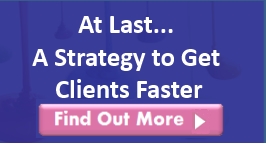
by Francis | Uncategorized
 Did you know that according to the latest findings in neuroscience about 80% of buying decisions are based on emotion; and only 20% are based on logic.
Did you know that according to the latest findings in neuroscience about 80% of buying decisions are based on emotion; and only 20% are based on logic.
Scientist found that decisions are primarily controlled by the limbic system in our brains which is responsible for emotions and behaviour in people.
This is quite interesting, because if science tells us emotions are important for making decisions, then emotions will play a role when people decide if they should work with you or buy your products.
In marketing terms this means that if you want more clients and if you want your marketing message to be effective, it’s absolutely crucial to incorporate emotions into it.
Emotions do not mean you need to make people cry, but you do want them to feel something – you want your marketing to evoke some sort of emotion or reaction within your audience: make them laugh; get them to nod their head; have them agree with what you say, get them to want what you offer….
For me, these emotions are often rooted in something that I call the Know-Like-Trust factor. It starts where people get to KNOW you… or know about you. Then it moves to where they start to LIKE you… and eventually this emotion evolves into trust where they TRUST that what you offer will make a difference in their lives.
Just think about your own personal life: When do you buy something? It’s mostly when you feel there is something in it for you. Right? When it just feels right; when you like it; when you trust that when you buy a product or a service you will benefit from it in some way…and that is how it is for most people.
One company that truly understands how emotions impact on buying decisions is Apple and the i-brand. And to practically demonstrate how this works, I want to show you two videos where Apple masterfully incorporates emotion into their brand. While you watch these videos, evaluate your own emotions – see what you feel and if you agree with what they say.
“ This is it. This is what matters. The experience of a product. How it makes someone feel. Will it make life better? Does it deserve to exist? We spend a lot of time on a few great things until every idea we touch enhances each life it touches.”
The above video is only a few sentences, but even if you are not a fan of the Apple brand, you will surely agree with what they say in this video, because that is the essence of good business – ensuring that what you do is making a difference in the lives of your clients.
Although the above video has nothing for sale, Apple does a great job at humanizing their message to touch on the emotions of their potential clients. If you agree and believe in the same things they believe in, it automatically strengthens the KLT factor and makes your buying decisions easier.
Here is another short Apple commercial to see how they brilliantly incorporate emotion into their marketing to sell their actual products.
Wasn’t that beautifully done? They use real life situations and emotions we all can relate to. And because we can relate to that, it creates a level of desire. If you like gadgets and cool features, you’ll think: I want that. I want to connect with my friends and family through Facetime. It’s so easy. Perhaps I should get an iPhone… and even if you are not into cool features or into the Apple brand, this commercial will hit a cord or two with you too – just because it is great to be connected to people and to share experiences instantly.
Now, although Apple is a huge company and has lots of marketing guru’s that can prepare their ads, you and I can do the same,
So, what I want you to take away from this article is this:
Be constantly aware that emotions play a big role in how your potential clients perceive your services and products, and it plays a role in their buying decisions.
Think about: How can you incorporate emotion into your own marketing message? How can you get your clients to want to get rid of the pain they currently experience? Or how can you get them to agree with what you offer and create a level of desire for your services / products?
To Your Success

PS: Did you enjoy the article? The greatest compliment you can give me is when you share this with others. It’s really easy! Just use the buttons below. Thanks!

by Francis | Uncategorized
 One of the first things I usually ask a new client is: “Who is your target market?”
One of the first things I usually ask a new client is: “Who is your target market?”
When they do not have one or their target market is not very well defined, we actively work on it until they know whom it is they want to work with.
So, what is a target market and do you really need to have one?
What is a target market?
Let me explain it with an analogy.
Let’s say that all the people in the world who might be able to work with you or who could find your services of value can be compared with a pie. All these people are however not your target market because they are just too diverse and different.
Your target market will be a smaller slice of this pie – it will typically be people who has similar characteristics; who you can easily identify; those people who you can help best with what you offer; who you will enjoy working with and who will pay your price without kibbling about it.
So you target market are those people who will most likely make use of your services or buy your products.
Do you need a target market?
In my opinion, YES. You need a target market and here is why:
Identifying a target market makes your marketing much, much easier.
It…
- Gives you the opportunity to work with people of your choice and to get to know them really well so that you can position your business to give them exactly what they need;
- Allows you to create a marketing message that is much more specific to your audience and which they will understand and respond to;
- Prevents the risk of diluting all your efforts by trying to meet every need of every client in every field. When you know the specific needs of your market, you can tailor your message and services to focus on solutions to those needs;
- Helps you generate more quality leads;
- Makes converting prospects into clients much easier;
- Helps increase the loyalty of your existing customers;
- Inspires people to spread the word about your business and what it is you do;
- Allows you to gain a competitive edge in the marketplace;
- Positions you as an expert or preferred supplier within your industry;
- Makes raising your rates easier – when you establish yourself as an expert with specific services that are in demand, your expertise is more valuable to clients and therefore you can charge more;
- Saves on marketing expenses since you concentrate on clients who will most likely make use of your services.
The key to targeting an audience is to be very specific – to identify a market that you’ll enjoy working with and who’ll receive massive value from working with you.
I truly believe that your ability to target and then connect with a specific audience can mean the difference between struggling and thriving as a service entrepreneur.
What do you think?

by Francis | Business, Marketing Tips |
 A business that attracts lots of clients is a business that focuses on service excellence.
A business that attracts lots of clients is a business that focuses on service excellence.
Anyone can give a service and find some clients, but someone who focuses on service excellence, will have a business that prosper and will attract clients into long-term relationships.
On vacation to Romania last year, I started to understand what service excellence really means and how it can practically put your business on a totally different level than your competitors.
While exploring the ski slopes of Poiana Brasov, a small town in Romania, we noticed one restaurant that was bustling with customers every single night, while others barely had one or two tables occupied. So, obviously we wanted to try it out. Due to a huge language barrier, we had to call in the help of our hosts at the B&B we were staying to make reservations for us for the second week of our stay. It turned out that this restaurant only take reservations and is normally fully booked for weeks in advance – even in off-peak seasons.
The wait was absolutely worth the while and here’s why.
Upon entering the restaurant, we were personally greeted at the door by the owner of the restaurant and taken to our table which was made of rough, solid sleeper wood and was beautifully laid out with sparkling silverware and fresh flowers (in the middle of winter in snow-filled mountains – that is a big wow). The chairs were covered with snow white sheep skin for added warmth and comfort. A big log fire blazed away in one corner and a traditional band with dancers kept us entertained with great lively music. We were just seated when they brought us warm, freshly baked bread with real butter. We were served complementary glasses of spicy “gluwein” (obviously the price of the wine was worked into the food somewhere, but the mere fact that it was not reflected on the bill made it special). The waiters were extremely efficient. The food was delicious and the presentation was faultless. A small mint chocolate was served with the after meal coffee. The bill was reasonable. All in all one of the best restaurants I’ve ever visited.
So, what made this Romanian restaurant stand out above the other restaurants in that area as well as above many of the so-called five star restaurants we’ve visited in our life before?
Well, everything they did had one goal in mind: Service Excellence.
Making you feel welcome; making you feel good by just being there. Attention to detail and small things like the chocolate with the coffee, fresh flowers, the personal greeting at the door, the beautiful table, clean silverware, the festive atmosphere, the complimentary gluwein, good food and good service – all working together to ensure a full restaurant and customers coming back for more.
That made me think: If a restaurant owner in the middle of nowhere can keep his restaurant fully booked for weeks in advance, how can we apply the same service excellence in our businesses as well.
For me, service excellence is about:
- Showing a great attitude towards your clients;
- Enjoying what you do and knowing how it can benefit your clients;
- Displaying exceptional behaviours and applying those to your client relationships.
- Finding ways to make your clients feel good about your services, your business and themselves because they simply feel good when dealing with you.
Here are some practical ways to create service excellence in your business:
Listen to your clients.
Let your clients talk and take the time to identify exactly what they need by asking questions and concentrating on what they are really saying. Listen to their words, tone of voice, body language, and how they feel. Show that you are listening by making the appropriate responses and suggestions or giving alternative options on how to improve things. By just listening to your clients, they not only feel heard and understood, but you also pick up on valuable nuggets that can help you improve on your service to give them exactly what they want and need.
Be reliable and deliver on what you say.
Reliability is one of the key aspects to any good relationship. If you say, “Your report will be ready on Tuesday”, make sure it is ready and delivered on Tuesday. Do not “over-promise” and then “under-deliver”. Rather do it the other way round – under-promise then over-deliver.
Always play open cards with your clients and be honest in all your negotiations.
Don’t tell a “half” truth or withhold information from your clients, just to “save face” or earn a few more bucks. When you are honest about situations, even when you’ve made a bad mistake, you’ll win the client’s respect and trust.
Deal with complaints promptly.
No one likes hearing complaints, but when a client complains, the chances are there might be a problem or a misunderstanding that is causing it. Listening and solving complaints is an ideal opportunity to restore goodwill, keep a client and build stronger relationships. Handling complaints can also help you to improve your procedures thus eliminating or minimising similar issues in future.
Pay attention to small detail and give them more than expected.
Be creative and give your clients what they do not get elsewhere. People love to get more than they thought they were getting – and it doesn’t need to be something big to be effective. E.g. send a small gift when someone start a big project with you; include a thank-you note when you’ve completed a project; send a message on their birthday– even when you’re not working together anymore; follow-up and thank them even when they don’t buy from you; send them information to help them in their business without expecting anything in return; give them a coupon for a couple of additional service hours. There are all sorts of ways to go the extra mile and to give them more than they expect. They may not say so, but people notice when you make an extra effort and will tell other people.
Creating service excellence in your business doesn’t cost much, but it can mean a world of difference to your clients and your business. If you deliver service excellence consistently, it’s a free form of marketing. Over time your business will become known for its good customer service and you’ll create a business that prosper and attract clients into long-term relationships.
Your take-away assignment for this week
How can you create even more service excellence in your business to make your clients come back for more? Please go ahead and share your ideas in the comment box below. Let’s all learn from each other.
PS: “If you enjoyed this post, the greatest compliment you can give me is when you share this with others. It’s really easy! Just use the buttons below. Thanks! I sincerely appreciate it.”

by Francis | Business
 It doesn’t matter how you look at it: pricing your services can be a difficult task.
It doesn’t matter how you look at it: pricing your services can be a difficult task.
The good news is you have some flexibility in how you set your prices.
The bad news is there is no true formula you can just pull off the shelf and apply in your business.
Pricing your services involves part number crunching, part experience and part guesswork.
But however it may be, below are 7 key factors that you can take into account for setting the best rate for your services.
1. How Much Do “You” Cost?
How much is your blood, sweat and tears worth? Think about it: by being self-employed, you are also incurring an opportunity cost by NOT making yourself available elsewhere for a dependable salary or receiving a nice benefit package from an employer. Please, don’t get me wrong on this. Being an entrepreneur was one of the best decisions I made in my life, but it is good to bring things into a “financial” perspective by thinking about what you are “giving up” and what you are “gaining” by being self-employed.
2. Your Business Running Costs
When setting your rates, you need to figure in all your business expenses and running costs. If you don’t, you might price your services at a rate that does not produce a profit in the end. Ensure you factor in all the hidden costs of your business like insurance, taxes and invoices that might not get paid for one reason or another.
3. Your Profit Percentage
Somewhat related to your costs, think about how much money you want to make above breaking even. This is business after all.
4. Market Demand
If what you do is in high demand, e.g. a lot of people are searching for these services it can positively impact on your rates and you can easily increase your fees.
5. Industry Standards
It’s sometime hard to know what others are charging for the same or similar services you deliver. But try asking around. The more you know about industry standards, the better you’ll know how to position your business in the market. As a solo entrepreneur, it is however never a good idea to position yourself below the market to try and win clients based on price.
6. The Value You Add to Your Clients.
Think about the value that a client will receive from working with you. How will working with you benefit or positively impact their lives and/or business? Set your rates accordingly.
7. Your Niche and Target Audience.
Your niche and target market can impact your rates. For example, think about the difference between Revlon and Chanel: Both companies make perfume but Chanel targets a small niche market of elite clientele and thus charges a high price for their products while Revlon targets a broader market and thus offer their products at a more affordable rate. Figure out how you are positioning yourself and use it to determine your rates.
In the end, all these intangible factors can have an impact on pricing your services and it is important to think about them as they can help you determine the real “worth” of the services you deliver.
Once you’ve decided on a price, continue to test the market and remember to raise your rates from time to time.
In the end, how you price your services could be the difference between a profitable and thriving business or a struggling one.
So go out there and charge what you are worth!
Now, I want to hear about you and what you think about rates. Tel us in the comment box below which of these factors you’ll use to price your services in future.
PS: “If you feel someone else can benefit from this list of factors, you are welcome to share this with others. It’s really easy! Just use the buttons below. Thanks!”

by Francis | Uncategorized
I can still remember the time when my daughter was about 3 or 4 years old and constantly asked me “why” on every single conversation (or sentence) I said. It drove me nuts.
 Today she is a teenager and is still starting her sentences with the word “Why”: Why do I have to do that? Why can’t I go? Why does it have to be like this? Why can’t it be like that? And the answers these days are not so straight forward anymore. Sometimes I really need to delve deep and think about it to be able to give good, satisfactory answers. But I found that the best answers (with the least amount of resistance) are those deeply rooted in our values, faith and the things we as a family belief.
Today she is a teenager and is still starting her sentences with the word “Why”: Why do I have to do that? Why can’t I go? Why does it have to be like this? Why can’t it be like that? And the answers these days are not so straight forward anymore. Sometimes I really need to delve deep and think about it to be able to give good, satisfactory answers. But I found that the best answers (with the least amount of resistance) are those deeply rooted in our values, faith and the things we as a family belief.
Perhaps it is psychological manifestation or the power of a habit, or something – but her inquiring attitude and questioning the things we do are rubbing off on me as I’m starting to ask the same type of “Why” questions about my business as well. Why am I doing this? Why does it matter? Why do I care? Why should other people care about it? And the answers are scary, surprising and eye-opening.
You see, mostly when we start out in business, we know WHAT we want to do – I want to help people get more clients; I want to be an engineer, a doctor, a web-designer, a virtual assistant, a life coach.
Then as time goes on, we get a pretty good idea HOW to do it and we can even get successful at doing it.
But, do you know that very few people really know WHY they do the things they do.
E.g. very few people REALLY know why they started their business in the first place; Or why they want to start a business; Why they deliver specific services; Why they sell specific products; Why they spend so much time developing things. For many it just seemed like a good idea at the time.
So the question I want to ask today is:
Do you know WHY you do what you do?
…and not just the obvious season – “to make more money”. But the real, deeper reason of WHY you do what you do.
I realized that knowing the answer to this WHY question is truly invaluable – especially in business – because it gives you a strong sense of purpose and helps you to clarify if you are making the right decisions. By understanding what’s on the line for you, you will care more about the end result than the steps that will get you there.
And a funny thing usually happens. Once you focus and get clear on the “why” of doing things, the “how to do it” often just falls into place or becomes much easier.
This happens because when your why is a strong enough reason, you are motivated to take the action to do it. And when you start taking that very first action step, opportunities will open up and you will enjoy taking on each challenge along the way.
Just think about it: Will it be easier to do something and overcome the challenges when it is important to you or when you know it will make a positive impact in your life and the lives of those you are in contact with? You bet it will.
So, I want to give you a challenge today..
Next time you want to do something big OR even when you set your goals for this year, reverse the process.
Don’t start with the “HOW to do it”.
Start with the “WHY you want to do it”.
- Do some soul searching and get down to the bottom of the reasons. You’ll be amazed at how it suddenly gives you a sense of purpose and a truckload of motivation to push through and actually achieve those things you set out to do – even if you don’t know exactly how.
- Then just take the first step. That will lead you on the path where the plan and the process just suddenly appear or become clearer and clearer with every step you take.
I’m going to do it from now on. Will you join me?
Let me know in the comment box below and then go out and make this year a purpose-driven, exceptional year!
Why?
Because you deserve it! 🙂

 Did you know that according to the latest findings in neuroscience about 80% of buying decisions are based on emotion; and only 20% are based on logic.
Did you know that according to the latest findings in neuroscience about 80% of buying decisions are based on emotion; and only 20% are based on logic.![]()








